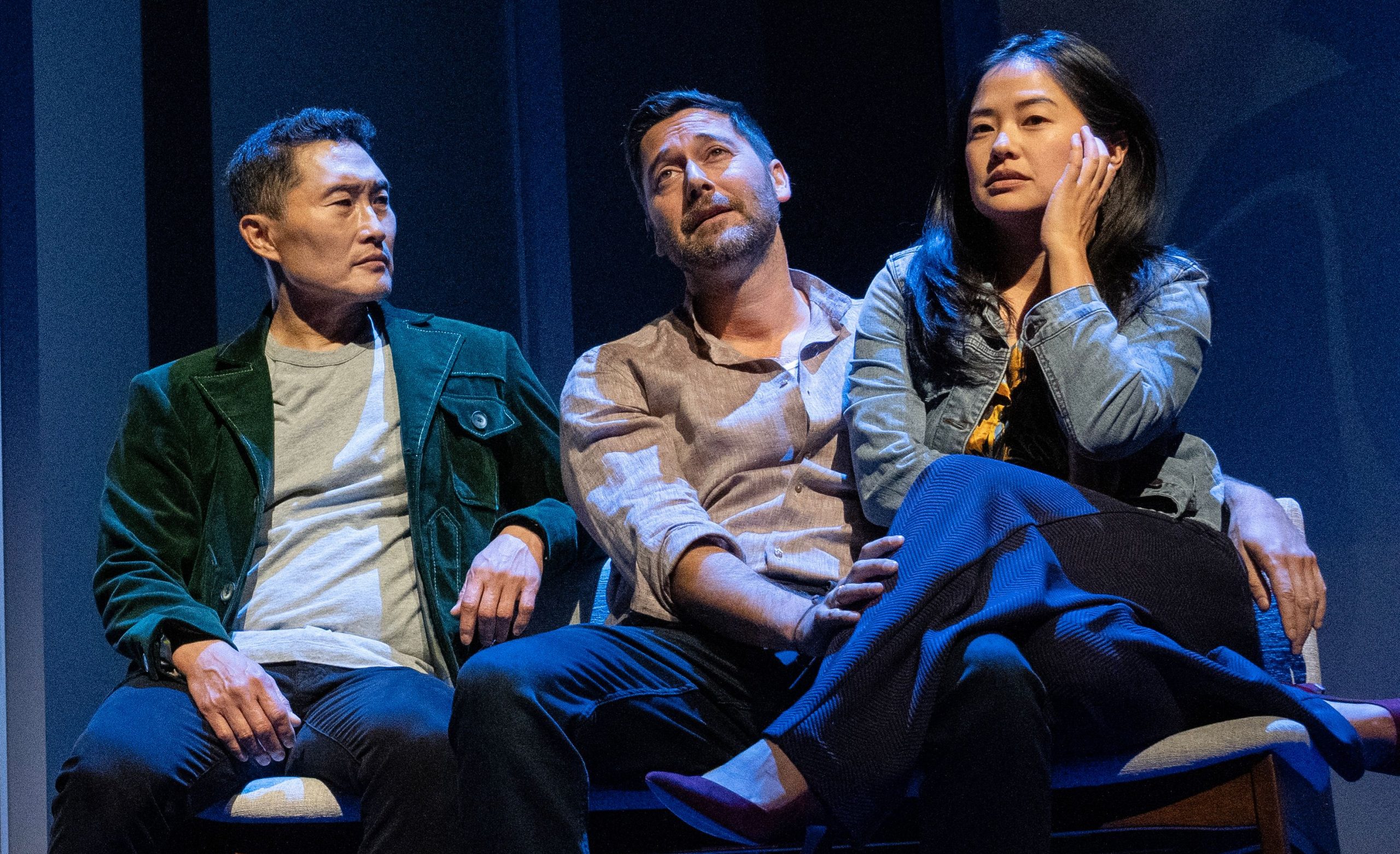YELLOW FACE
by David Henry Hwang
Directed by Leigh Silverman
Starring Daniel Dae Kim
A Production of the Roundabout Theatre Company
Todd Haimes Theatre
Reviewed by David Spencer
Many are the storytellers, in prose and drama, who have—at times or in toto—successfully used their art as a bully pulpit for causes near and dear to them, and with no little courage…but it takes a particular and different kind of courage for a writer to examine not only the subject at hand, but how his own zealousness may have blinded him from seeing a bigger picture. And in Yellow Face, currently in revival at the Todd Haimes Theater (c/o the Roundabout Theatre Company), David Henry Hwang has wonderfully pulled off that double-barreled trick. And he does it with what seems to be an autobiographical docu-drama. Or docu-comedy-drama. It’s a venture into hybrid territory that still seems under-explored, so it’s hard to be precise. (The closest thing to it I can think of is William Goldman’s “autobiographical” foreword to his novel The Princess Bride—but only kind of close.) Suffice it to say that our narrator and guide is “DHH”—as the program calls him, but in the text, the author’s full name is used without resorting to such coyness (played by Daniel Dae Kim)—while the rest of the ensemble play multiple roles in the saga. Save one, who like DHH, has his own, solitary role.
Hwang was among the most vocal Asian artists who protested the importation of occidental Jonathan Pryce to recreate his London role as the half-Asian “Engineer” in the Broadway debut of Miss Saigon. But having registered his protest, publicly and in print, Hwang felt he’d made his point and sat out active demonstration. The brouhaha ended, of course, favoring power producer Cameron Mackintosh. This is dramatized.
Some years later, Hwang decided to revisit his protest in the form of a play, a farce he called About Face, which concerned such a casting move being thrown into chaos by an interfering Asian actor. The out of town reviews were not encouraging and in New York it closed in previews. This too is dramatized.
Also dramatized is Hwang’s own inadvertent casting of an occidental actor in the lead Asian role, and the consequences of that; the change of fortune in said actor’s career as—despite being let go before the show comes to NY—he uses the Hwang association to refashion his identity, and become a prominent spokesperson for the Asian community. The irony of this, and the effect it has on DHH’s equilibrium, is profound—especially when compounded by the views of his decidedly “civilian”-minded banker father (Francis Jue, revisiting one of the roles he assayed in the original production), founder of the first commercial Asian bank in the USA. Whose dream of American citizenship was shaped, when he was a young man in China, by American films, and the aspiration to live up to the iconic images provided by James Stewart and Henry Fonda.
There’s even more going on here than meets the Asian or European/North-American eye, because there’s a point where the events that Hwang dramatizes diverge from historical truth…and ideally, unless you know the play, you won’t know the moment when you’ve pivoted from dramatic license into interpolated invention—but Hwang is interested, as of course a dramatist must be, in an even bigger truth; that being the ruthless dissection of racial politics both “good” and “bad”, and the notion that clinging to any absolutist position, even for the “right” reason, imposes unjust, prejudicial limits somewhere. In the end, Hwang suggests, specific context and the health of the human spirit must be deemed more valuable than any pure (or purist) ideology, liberal or conservative. In a way, this is agit-prop for the new millennium, evolved and complex, examining layers within layers. And it doesn’t hurt that, for the most part, Hwang delivers it with humor and unflinching self-deprecation.
In the key roles, Mr. Kim (DHH) amusingly explores the many colors of exasperation, while Ryan Eggold (late of TV’s New Amsterdam and The Blacklist) as his passing-for-yellow bane never loses his patina of innocence, embodying the old Jean Girodeux maxim which goes, “The secret of success is sincerity. Once you can fake that you’ve got it made.” Other cast members, the aforementioned Mr. Jue, plus Marinda Anderson, Greg Keller, Sharon Tyo and Kevin Del Aguila, ably deliver the “epic shorthand” of the quicksilver, bare-bones, nearly “black box” style production—directed by Leigh Silverman, who, like Mr. Jue, is also revisiting her role on the original production.
In 2007, I had quibbles with segments that seemed overwritten, thematic points that seemed overarticulated, but wrote that “the bumps are minor and fixable, and I wouldn’t be surprised to find them attended to in future:” I don’t know if indeed some trims and tweaks have been applied…but I didn’t feel much in the way of attenuation this time out. And given the diversity explosion within the last not-quite-decade of American theatre, Yellow Face seems even more resonant and relevant than it did 17 years ago. You can’t ask more of a play of ideas than that it keeps you thinking…and thinking even more the second time around…
